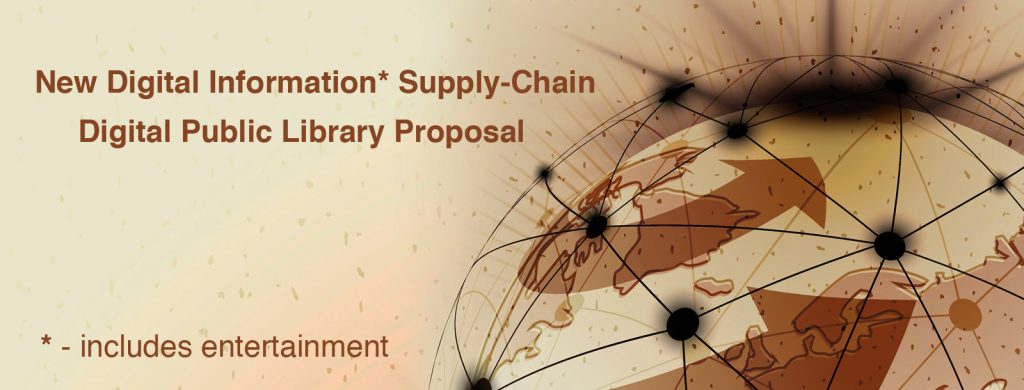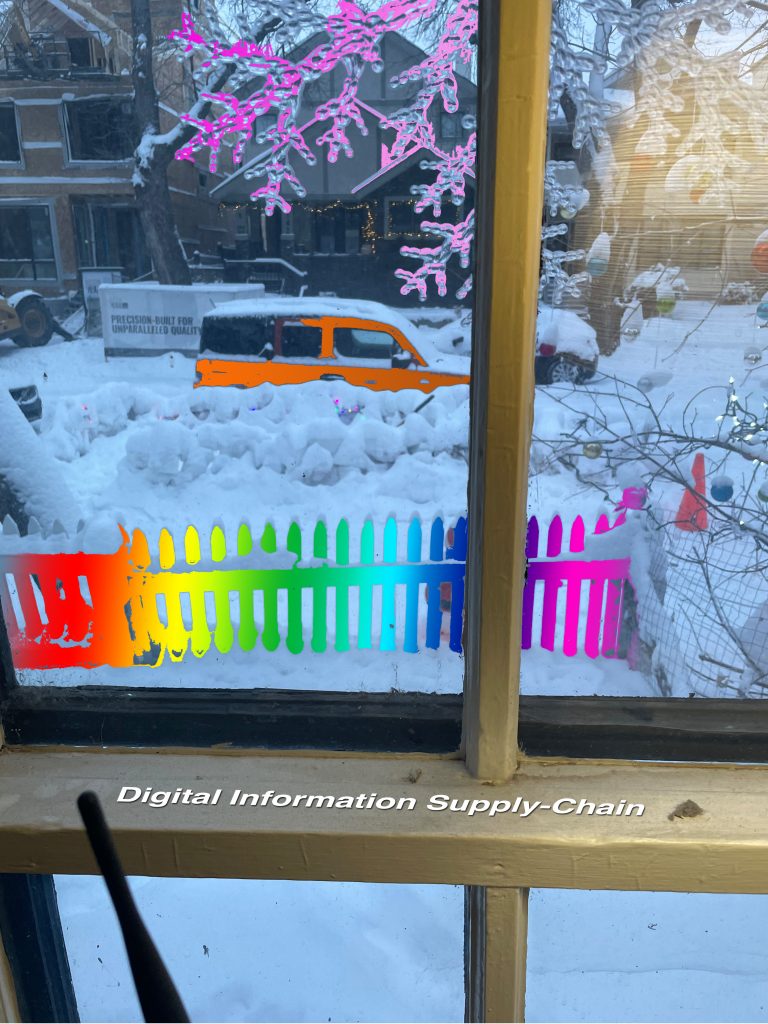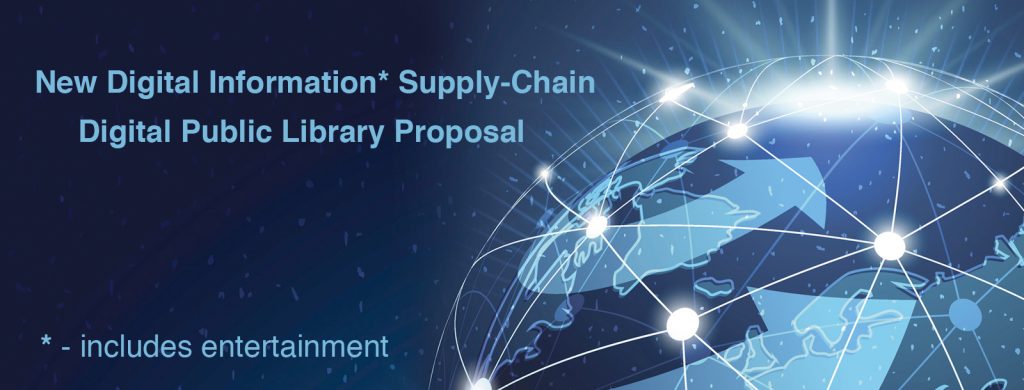* – includes entertainment

Despite dreadful news every day I am encouraged by how so many people I know are adapting to change and finding new ways to live and find joy and meaning in our lives. More and more I am thinking the way to speed up our response to the climate emergency and strengthen democracy is to get big money out of politics. More and more I think the way to get big money out of politics is to build a New Digital Information* Supply-Chain. DISC
(* includes digital entertainment)

Action paralysis
To de-paralyze climate action and social justice action. We need to de-privatize the DISC by building a digital public library that will be solely a service for the user.
The digital-information-supply-chains we presently rely on, are polluted with predatory pitches, (advertising, hate and lies). Although we have access now to more information and entertainment than ever, the commercial info supply-chains are primarily a predators tool and the information we want serves only as bait to capture our attention for the predators’ purpose of influencing our political and commercial choices.
Hoarding a glut of info for profit
In the current supply-chain, enterprises hoard digital information under the protection of copyright law designed for the pre-digital age. They restrict its free flow in the market of ideas. The fact is there is no shortage of digital files. It is also a fact that it does not cease to exist once it is consumed, unlike other commodities like for instance a bushel of wheat or a barrel of oil. In short there is a glut of digital files.
What happens to price when there is a glut? In a free market when there is over supply of a commodity its price drops. In the case where there is infinite supply the commodity becomes available virtually for free. So what enables enterprises to hoard digital information to make it scarce and therefore a very valuable commodity? One thing as touched on already; copyright law but also the fact that we have no publicly funded DISC.
It would be an incredibly change for societies progress, for the state to invest in our future now by purchasing the copyright to everything, so that poor people can have access to the best now instead of having to wait 50 years by which time they will have lost the opportunity to benefit from accessing the best.
Systemic conflict of interest
Current private enterprises in the DISC are dual enterprises. For a price, they serve users demands and they also serve advertisers. Being private corporate entities they must place profit above the users who are people.

Alberta’s Bill 81
The debate over Alberta’s Bill 81 shows that Big money in politics is a problem for democracy. This is a beautiful solution. I encourage everyone to give some attention to understanding and then promoting a systemic solution: The Digital Public Library
Regulation is a small part of the solution
Of those concerned with a lack of truth and accuracy in our electronic digital communications systems, it is assumed by most that a body of well thought out regulations is the solution. Rightly so, those driven to speak up for strict regulation as the solution, are driven by fear and disgust that technology is favouring profit over people and private enterprises are using practices that should be criminalized. Regulation though essential is only a small part of what can be done to clean up and organize communication. User control is what we need. A public digital-media-access-service, can provide user control where commercial digital-media-access-services cannot.
User Control
For this age we do not need a nanny state nor a nanny corporation deeming what digital media content we can and cannot expose ourselves to.
Maintaining the right to free expression while limiting the opportunity to advertise
The failure to publicly provide a service that is in high demand has resulted in this terribly undemocratic situation we face where there is a huge opportunity for wealthy people and their organizations to buy a dominating voice. There is a beautiful solution. Public provision of a service that is now financed with advertising will severely limit the opportunity to buy advertising. Due to our freedom of expression guarantees (which I hope we wish to retain) it is very difficult to prohibit or even regulate advertising. Publicly providing access to media-content, does not limit freedom of expression but it will limit the opportunity to advertise to people while they are satisfying their natural desire to know and be thrilled.
Long Range Solutions
I feel we have to put some energy into long range solutions or they will never happen. 60 years ago Medicare happened in Canada. A few spoke up and then many. Then we passed the legislation that de-privatized the medical insurance industry. We need to pass legislation to de-privatize the media-content-access industry. We need legislation to create a new public service to replace the mostly foreign private firms that are now monopolizing the provision of access to media-content.
Safe and Free Access
Digital Public Library? To be clear I am talking about a nonprofit, publicly funded but independent media-content-access service to provide everyone with the access to media-content that is now being provided by, to name some majors; YouTube, Google, Facebook, Twitter, Instagram, WhatsApp, Spotify, Netflix, Amazon and and many more. We need a service that lets us access all content (including text books, academic papers and even live sporting and entertainment events) without having to pay a fee and without requiring us to consent to being surveilled and exposed to predatory advertising pitches intended to manipulate and influence our political and commercial choices.
It could and should also include social media, search and other information-sorting and communication utilities to enable citizens to interact with one another and develop resources for social and political communication.

Sustaining Production Workers
This service also needs to provide remuneration for the firms and individuals that produce media content and the remuneration should be democratic, based on people’s self-chosen use of media content. In the digital content realm, the remuneration can be automatic when transactions are triggered by real identifiable individuals’ use of media-content, and when the payments are made to real identifiable owners and producers of the media-content. Addressing the issue of privacy, it should be noted just as is done by Statistics Canada, general measurements can me made without tracking individuals’ identities.
Discouraging those who may want to profit from deception
The intention is to displace commercial digital-media-content-access-services like Google, Facebook, YouTube, Twitter, Netflix, and provide access to content using the public service. It should be understood that presently when a person connects to one of these commercial services they are connecting to a robot. The public service would too of course be a robot. It would automatically trigger payments to content producers but importantly people using the robot should have a manual option to reverse a payment they have triggered, if for any reason the user deems the content to be inappropriate or unworthy. This is a powerful and democratic way to discourage those who may want to profit from deception. This is user control.
Partial Socialism (our society’s reality)
I am not talking about a total socialization of media industries, just the access arm of the industry. I am fine with the production arm of the media industries remaining a mix of for profit and nonprofit organizations with part of their revenue streams coming from both public and private donations or grants, but mainly I see the production industries being sustained by use based royalties being paid by the public access service (The Digital Public Library).
Costs
The argument for making democracy stronger and fairer, by publicly funding a digital public library service, is probably most important for everyone to understand. There is a second important argument. What about costs? It is assumed the commercial system we are using is overall economically beneficial. There is no hard proof that it is. I have a hunch it is not at all of economic benefit to ordinary people. We need an academic study with hard data showing that the commercial system is or is not raising people’s cost of living. We need a study to show that a publicly funded system would or would not lower the cost of living by more than it would cost in taxes to fund a public system. We need to show that it is true or not true that the constant exposure to advertising creates artificial demand. (It makes people want things they would not naturally be wanting). We need to show that it is true on not true that the resulting artificial demand raises the cost of living for ordinary people and by how much. We need a good explanation, that if the cost is not coming ultimately out of consumers’ pockets then where are the billions of dollars coming from that are seen as profits by the major commercial digital platforms that have monopolized the media-content-access industry? Cost is of course important but even if my hunch is wrong that relying on a commercial system makes life more costly, what should we be willing to pay to have a strong and fair democracy?
The Pitch
Once again I would like to say — This is a beautiful solution. Big money in politics is a problem for democracy. I encourage everyone to give some attention to understanding and then promoting a systemic solution: The Digital Public Library
Let’s democratize the digital information supply-chain by creating a new public service: The Digital Public Library

